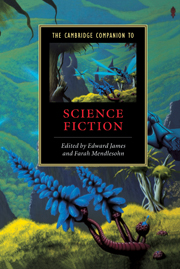10 - Science fiction and queer theory
from Part 2 - Critical approaches
Published online by Cambridge University Press: 28 May 2006
Summary
Axiom 1: People are different from each other.
It is astonishing how few respectable conceptual tools we have for dealing with this self-evident fact. A tiny number of inconceivably coarse axes of categorization have been painstakingly inscribed in current critical and political thought: gender, race, class, nationality, sexual orientation are pretty much the available distinctions.
(Eve Kosofsky Sedgwick, The Epistemology of the Closet)‘We have to hide,’ the other said gently. ‘You still kill anything that’s . . . different’.
(Theodore Sturgeon, ‘The Sex Opposite’)Science fiction and the idea of sexuality
Knowing sf’s potential for using the future to explore contemporary reality and its alternatives, one might think the genre ideal for the examination of alternative sexualities. Critics of sf have generally agreed that science fiction is a ‘literature of ideas’. Indeed, for many people, it is the ideational content of sf that is its primary characteristic. Sexuality is also an idea. In this sense, one might well expect to find an intrinsic compatibility between sf as a genre and the exploration of human sexuality. For many people, however, sexuality – and particularly heterosexuality – can be envisioned only within the category of the ‘natural’. To these people, sexuality is quite specifically not an idea; it is the very reverse of the ideational – instinctive, sensate, animalistic. It is at once both ‘common sense’, as in the apparent logic of procreative sex, and unthinkable, since even apparently procreative sex calls into play emotions, positions, actions and desires whose potential for perversity, even if it is merely the perversity of pleasure, are too frightening to contemplate. And yet, even for these people, sex is an idea because it is, after all, an ideology and one which contemporary Western societies have tried very hard indeed both to propagate and to control.
- Type
- Chapter
- Information
- The Cambridge Companion to Science Fiction , pp. 149 - 160Publisher: Cambridge University PressPrint publication year: 2003
- 15
- Cited by

